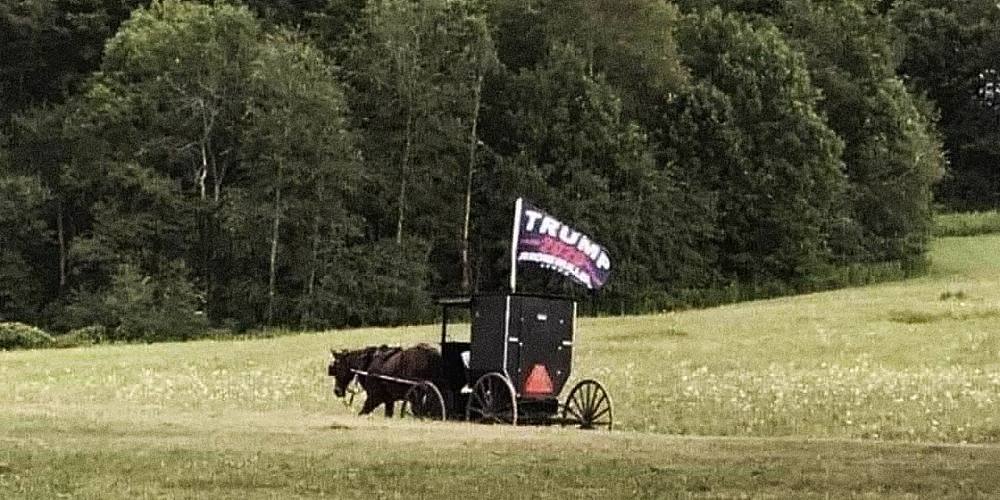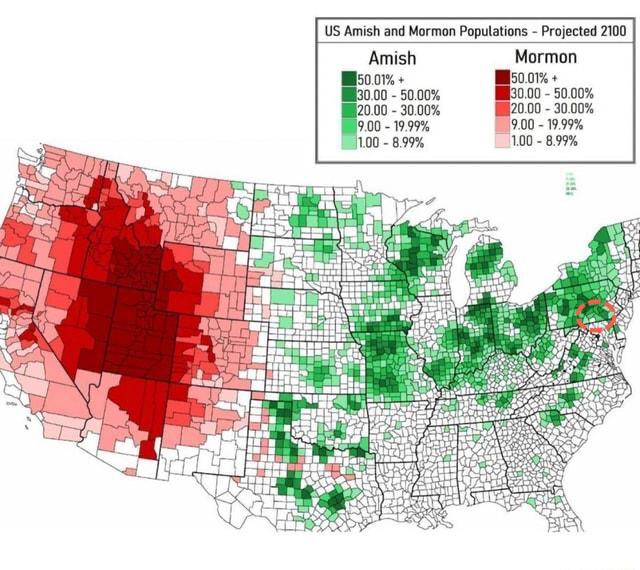Subscribe for free to the America First Report newsletter.
(Zero Hedge)—As Pennsylvania’s polls near closing, an unexpected twist has emerged: a massive mobilization of Amish voters. Known for their separation from mainstream society and reliance on traditional values, such as horse-and-buggy transportation (arguably more ‘green’ than EVs), these folks, traditionally not big participators in US politics, have been out in force at PA polling stations, voting for former President Trump after Biden-Harris’ big gov’t waged war on the community.
Let’s begin with the context. Earlier this year, the Pennsylvania Department of Agriculture and big government Democrats targeted a small Amish farmer in Lancaster over compliance issues. This apparently infuriated the Amish community that many of them registered to vote and voted red in the last several days.
Big Gov't Raids Small Amish Farmer Who Refuses To Participate In The Industrial Meat/Milk Complex https://t.co/3W8ItfuWd8
— zerohedge (@zerohedge) January 6, 2024
Real America’s Voice’s Tera Dahl was speaking at a Trump rally in Pennsylvania on Monday, and she explained that the Amish community is not a traditional group of voters in US elections.
“But they’re voting this year – and I think a big reason is the overreach of government – and one example that could’ve had a big impact was back in January. An Amish farmer was selling his milk – and the gov’t raided his home and stopped his business,” she said.
AMISH FOR TRUMP! Tera Dahl reporting that the Amish are tired of the government overreach on their lives and are showing up for Trump in Pennsylvania. pic.twitter.com/ftNJWTRZLC
— Real America's Voice (RAV) (@RealAmVoice) November 4, 2024
An Amish person was asked outside one PA polling station: “Who are you voting for?”
He responded, “Donald Trump.” He explained that the Amish had “more freedoms under Trump,” while government overreach drastically increased under Biden-Harris.
The Amish coming out to vote in 2024 reminds me of the trees going to battle in the Lord of the Rings. pic.twitter.com/420b6Rc1Xh
— Laura Powell (@LauraPowellEsq) November 5, 2024
US Rep. Lloyd Smucker, R-Pa., whose district includes Lancaster County, at the epicenter of America’s Amish population, told PBS News last week, “They just want government to stay not only out of their businesses but out of their religion.”
With family roots deep in the Amish community, Smucker forecasted a dramatic increase in the Amish vote, “basing that on the enthusiasm we see.”
The Amish are out in full force voting for Trump in PA pic.twitter.com/ugfaczuLOz
— DC_Draino (@DC_Draino) November 5, 2024
Amish are out voting for Trump in Pennsylvania and North Carolina!!!
Amish for Trump! 🇺🇸 LFG🔥🔥🔥 Go Vote!!!#ElectionDay #Election2024 #Trump2024 #RedWave2024 #RedWave #Vote2024 pic.twitter.com/BBW3jMXUVS
— AJ Huber (@Huberton) November 5, 2024
You know it’s serious when the Amish get involved.❤️🇺🇸 pic.twitter.com/5PBTD6s4dF
— azure 🇺🇸 (@azury1455181) November 5, 2024
Elon, we’ve been courting the Amish the vote in Pennsylvania.
Every Tuesday, we registered voters at Root’s Country Market in Lancaster.
Every Friday, we were at the Green Dragon Farmers Market.
I even spoke about the Amish during my speech on stage at Butler.
Let’s go. pic.twitter.com/2pJMcsDbdI
— ThePersistence (@ScottPresler) November 4, 2024
Even the Amish know pic.twitter.com/t6gxdtHEUc
— Gunther Eagleman™ (@GuntherEagleman) October 31, 2024
WHY DO AMISH♥️TRUMP?
ANYTHING YOU DON’T LIKE ABOUT KAMALA?
“Yeah, they’re involved with the deep state”.YOU’RE FAN OF TRUMP?
“Yes we are”.WHY?
“Because he’s a business person. We are too”.ANYTHING ELSE?
“There’s a lot… we need better border. We need less regulations, less… pic.twitter.com/qWFfxm8Guc— AmericanGreatness (@NONbiasedly) November 4, 2024
🇺🇸 The Pennsylvania Amish Community… pic.twitter.com/qwrUmDV7Fs
— Mario Nawfal (@MarioNawfal) November 4, 2024
They must know something pic.twitter.com/j905cPBHV1
— Meme Wars (@_MemeWars) November 4, 2024
What Would You Do If Pharmacies Couldn’t Provide You With Crucial Medications or Antibiotics?
The medication supply chain from China and India is more fragile than ever since Covid. The US is not equipped to handle our pharmaceutical needs. We’ve already seen shortages with antibiotics and other medications in recent months and pharmaceutical challenges are becoming more frequent today.
Our partners at Jase Medical offer a simple solution for Americans to be prepared in case things go south. Their “Jase Case” gives Americans emergency antibiotics they can store away while their “Jase Daily” offers a wide array of prescription drugs to treat the ailments most common to Americans.
They do this through a process that embraces medical freedom. Their secure online form allows board-certified physicians to prescribe the needed drugs. They are then delivered directly to the customer from their pharmacy network. The physicians are available to answer treatment related questions.








